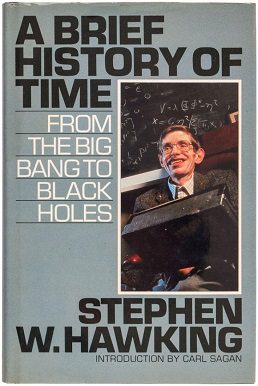Shopping Cart
-
${ item.product_title }$ ${item.price}


People are viewing this right now
Stephen Hawking has earned a reputation as the most brilliant theoretical physicist since Einstein. In this landmark volume, Professor Hawking shares his blazing intellect with nonscientists everywhere, guiding us expertly to confront the supreme questions of the nature of time and the universe. Was there a beginning of time? Will there be an end? Is the universe infinite or does it have boundaries? From Galileo and Newton to modern astrophysics, from the breathtakingly cast to the extraordinarily tiny, Professor Hawking leads us on an exhilarating journey to distant galaxies, black holes, and alternate dimensions--as close as man has ever ventured to the mind of God. From the vantage point of the wheelchair from which he has spent more than twenty years trapped by Lou Gehrig's disease, Stephen Hawking has transformed our view of the universe. Cogently explained, and passionately revealed, A Brief History of Time is the story of the ultimate quest for knowledge: the ongoing search for the tantalizing secrets at the heart of time and space. A Brief History of Time: From the Big Bang to Black Holes is a book on theoretical cosmology by the physicist Stephen Hawking. It was first published in 1988. Hawking wrote the book for readers who had no prior knowledge of physics.
In A Brief History of Time, Hawking writes in non-technical terms about the structure, origin, development, and eventual fate of the Universe, which is the object of study of astronomy and modern physics. He talks about basic concepts like space and time, basic building blocks that make up the Universe (such as quarks), and the fundamental forces that govern it (such as gravity). He writes about cosmological phenomena such as the Big Bang and black holes. He discusses two major theories, general relativity and quantum mechanics, that modern scientists use to describe the Universe. Finally, he talks about the search for a unifying theory that describes everything in the Universe in a coherent manner. Wikipedia